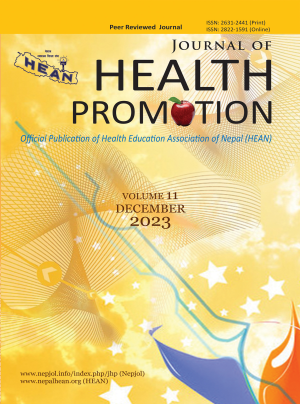Knowledge on Nutrition and Dietary Diversity Among Community School Adolescents in Kathmandu Valley
DOI:
https://doi.org/10.3126/jhp.v11i1.61197Keywords:
Adolescent, dietary diversity, health belief model, Nepal, nutrition knowledgeAbstract
Nutritional knowledge and practices among adolescents are critical to combat health problems that can continue into adulthood. The study determines the nutritional knowledge and dietary diversity and its associated factors among school adolescents of Kathmandu Valley. The study adopted a cross-sectional design of 487 school adolescents using multistage cluster sampling. Information on socio-demographic characteristics, Health Belief Model constructs, nutrition knowledge and dietary diversity were collected. Bivariate and multivariate logistic regression models were used to identify the factors associated with nutrition knowledge and dietary diversity. Nutrition knowledge and dietary diversity were found inadequate; 47.4% had adequate dietary diversity and 42.5% had adequate nutrition knowledge Variables that were significantly associated with adequate nutrition knowledge (versus inadequate) in the presence of other variables were compared to reference group included age (adjusted odds ratio [aOR]= 0.83; 95% CI = 0.71-0.96), being from ethnic groups of Janajatis (aOR=2.79; 95% CI: 1.47-5.28) and Brahmin/Chhetri (aOR=1.9; 95% CI: 1.06-3.4), belonging to nuclear family (aOR=1.75; 95% CI: 1.18-2.6), literate father (aOR=2.16; 95% CI: 0.99-4.73), perceived severity (aOR= 1.19; 95% CI: 1.06-1.33) and perceived barrier (aOR= 1.02 ; 95% CI: 1-1.05). Variables that were significantly associated with consuming adequate dietary diversity (versus inadequate) in the presence of other variables include being male (aOR=1.52;95% CI: 1.01-2.29), having literate mother (aOR=1.7;95% CI: 1.02-2.83), consuming unhealthy diet daily (aOR=4.23;95% CI: 1.85-9.67), having adequate knowledge (aOR=2.4;95% CI: 1.59-3.63) and self-efficacy (aOR= 1.15;95% CI: 1.06-1.24). This study highlights the need for specific theories and model-based targeted interventions to encourage adolescents' healthy behavior and healthy eating.
Downloads
Downloads
Published
How to Cite
Issue
Section
License

This work is licensed under a Creative Commons Attribution-NonCommercial 4.0 International License.
© Health Education Association of Nepal (HEAN)
Authors are required to transfer their copyright to the Health Education Association of Nepal (HEAN).
The materials of this publication may be reproduced, reviewed and translated, acknowledging the source "Journal of Health Promotion".




